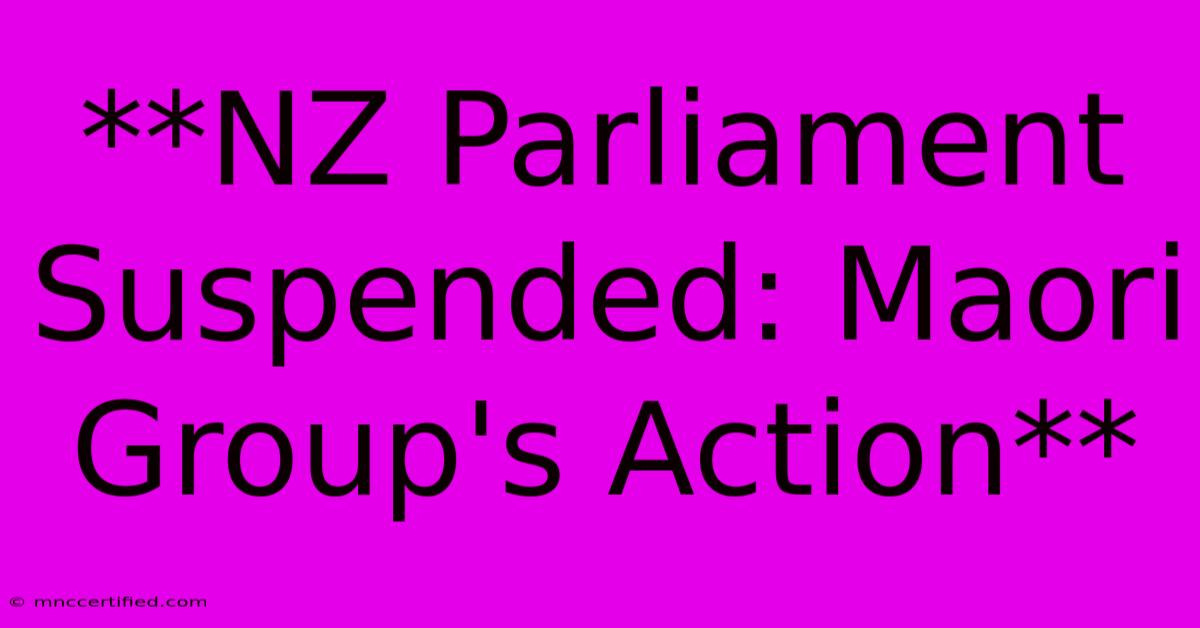**NZ Parliament Suspended: Maori Group's Action**

Table of Contents
NZ Parliament Suspended: Maori Group's Action Sparks Debate
On [Date], the New Zealand Parliament was suspended following a protest by a Maori group demanding action on climate change. This unprecedented event has ignited a national conversation about the role of parliamentary procedure, the legitimacy of protest, and the urgent need for climate action.
What Happened?
The protest, organized by [Name of Maori Group], saw a large group of demonstrators enter the parliamentary precinct. They occupied the Speaker's Lobby, demanding a meeting with the Prime Minister to discuss the government's climate change policies. The group raised concerns about the impact of climate change on Maori communities, including the loss of land and cultural heritage.
When their demands were not met, the protesters refused to leave, prompting the Speaker of the House to suspend parliamentary proceedings. This decision was made to ensure the safety and security of MPs and staff, and to prevent further disruption to the legislative process.
Reactions and Implications
The suspension of Parliament has sparked a wave of reactions across the political spectrum. Some politicians have condemned the protest as an attack on democracy, while others have praised the group's determination to raise awareness about the climate crisis.
The event has also raised important questions about the limits of protest and the responsibilities of government. While the right to peaceful assembly is enshrined in the New Zealand Bill of Rights Act, the disruption of Parliament raises complex issues around the balance between democratic rights and parliamentary function.
Moving Forward
The Maori group's protest has brought the urgency of climate change to the forefront of New Zealand's political discourse. It serves as a powerful reminder of the need for bold action to address this global challenge. The government is now under pressure to respond to the group's demands and to demonstrate its commitment to climate justice.
This event also highlights the importance of finding solutions that acknowledge the unique perspectives and concerns of Maori communities. As New Zealand navigates the path towards a sustainable future, it is essential to listen to the voices of those most affected by climate change and to work together to create a fair and just transition.
Key Takeaways:
- Protests can be a powerful tool for raising awareness and influencing policy.
- The government has a responsibility to respond to the concerns of its citizens.
- Climate change is a global challenge that requires urgent and collaborative action.
This event is likely to be remembered as a turning point in New Zealand's climate change debate. It remains to be seen how the government will respond to the demands of the Maori group and what steps will be taken to address the climate crisis.

Thank you for visiting our website wich cover about **NZ Parliament Suspended: Maori Group's Action** . We hope the information provided has been useful to you. Feel free to contact us if you have any questions or need further assistance. See you next time and dont miss to bookmark.
Featured Posts
-
Parliament Disrupted Nz Mps Perform Haka
Nov 15, 2024
-
Cycling Brand Assos Takes Legal Action Against Asos
Nov 15, 2024
-
State Farm Insurance Card Template
Nov 15, 2024
-
Satirical Site The Onion Buys Infowars
Nov 15, 2024
-
Fbi Investigation Targets Polymarket Ceo
Nov 15, 2024